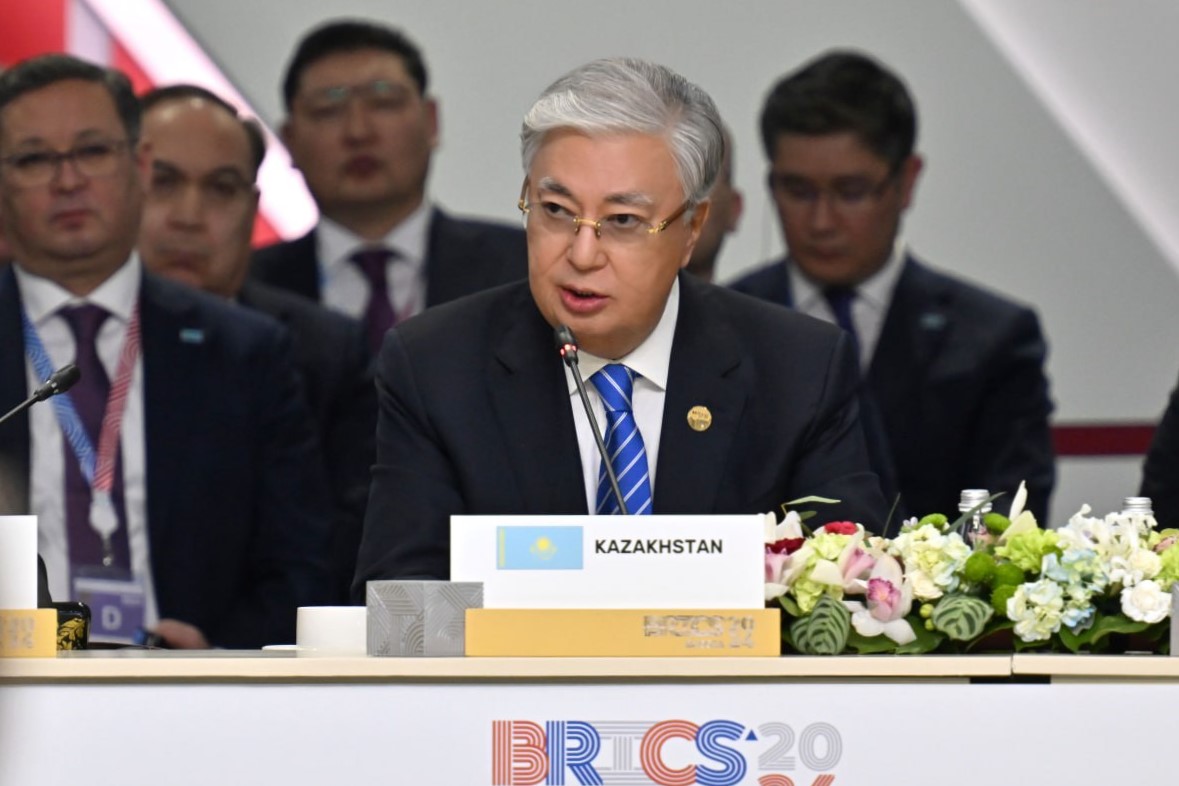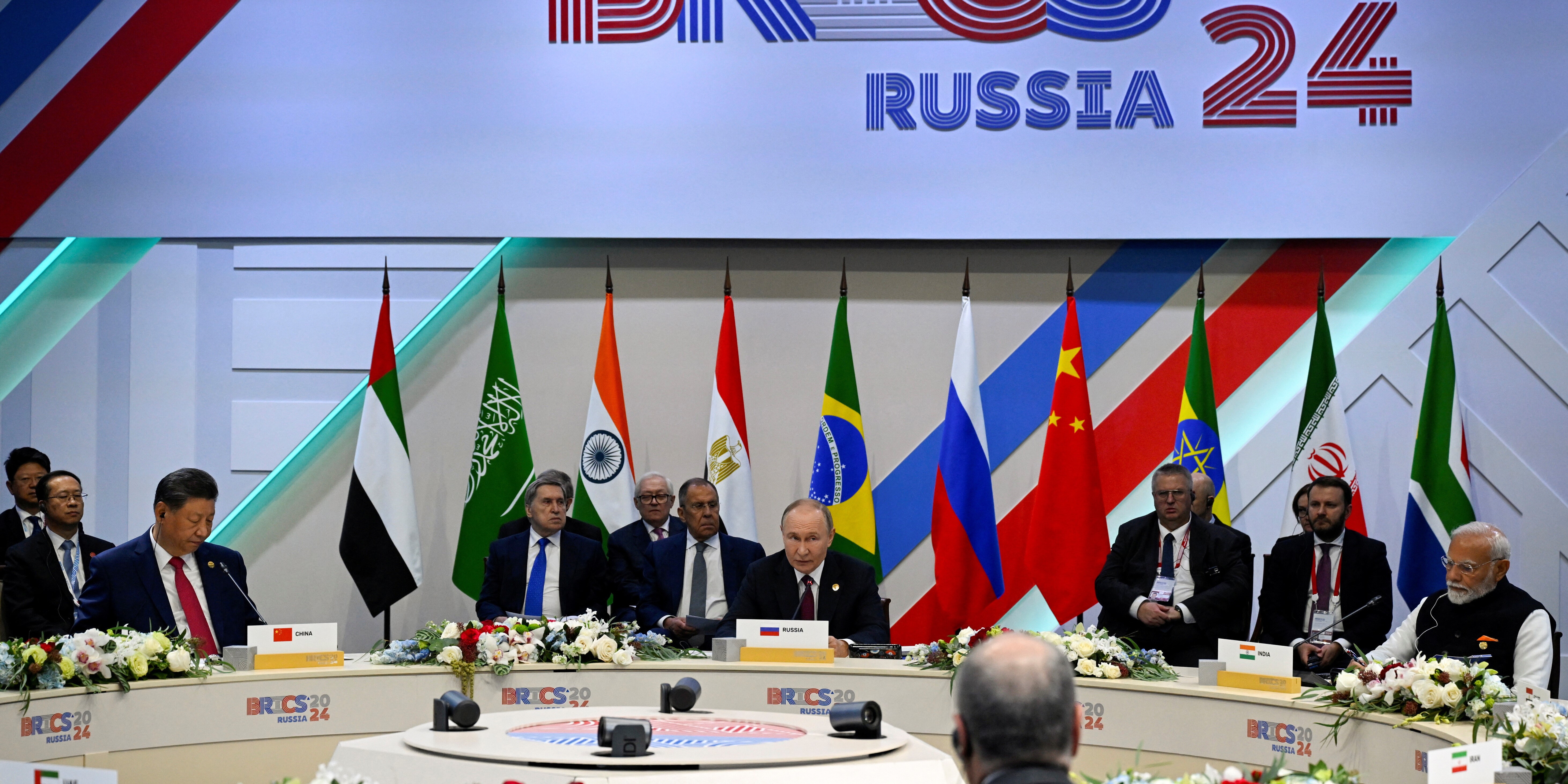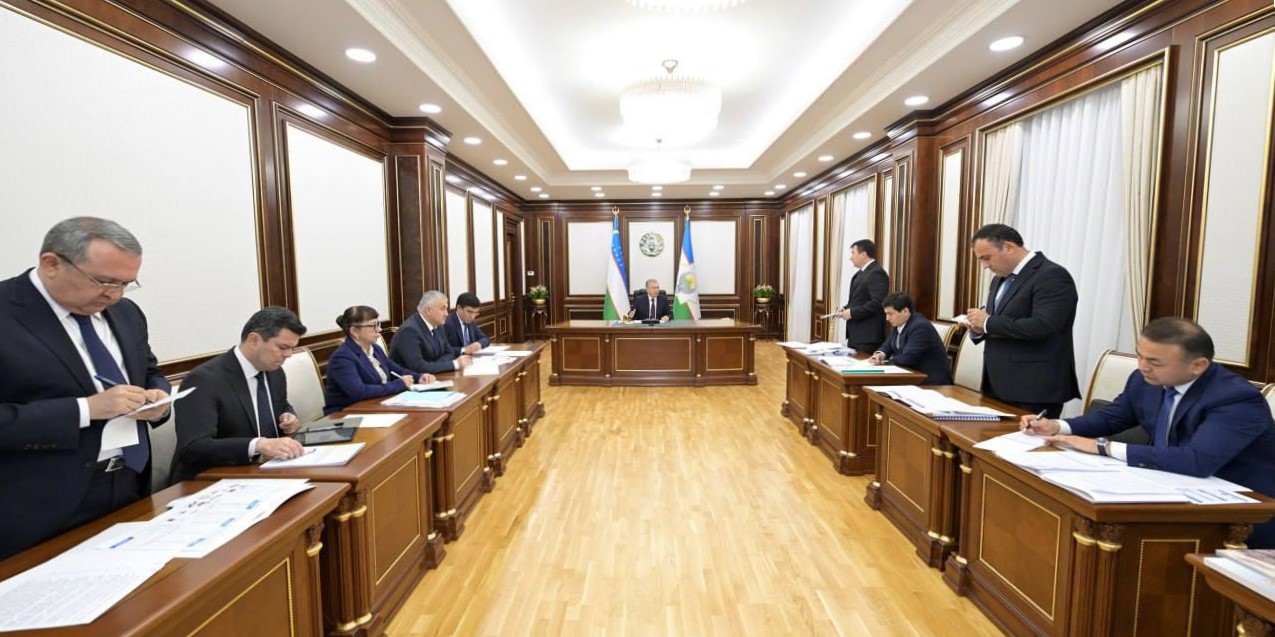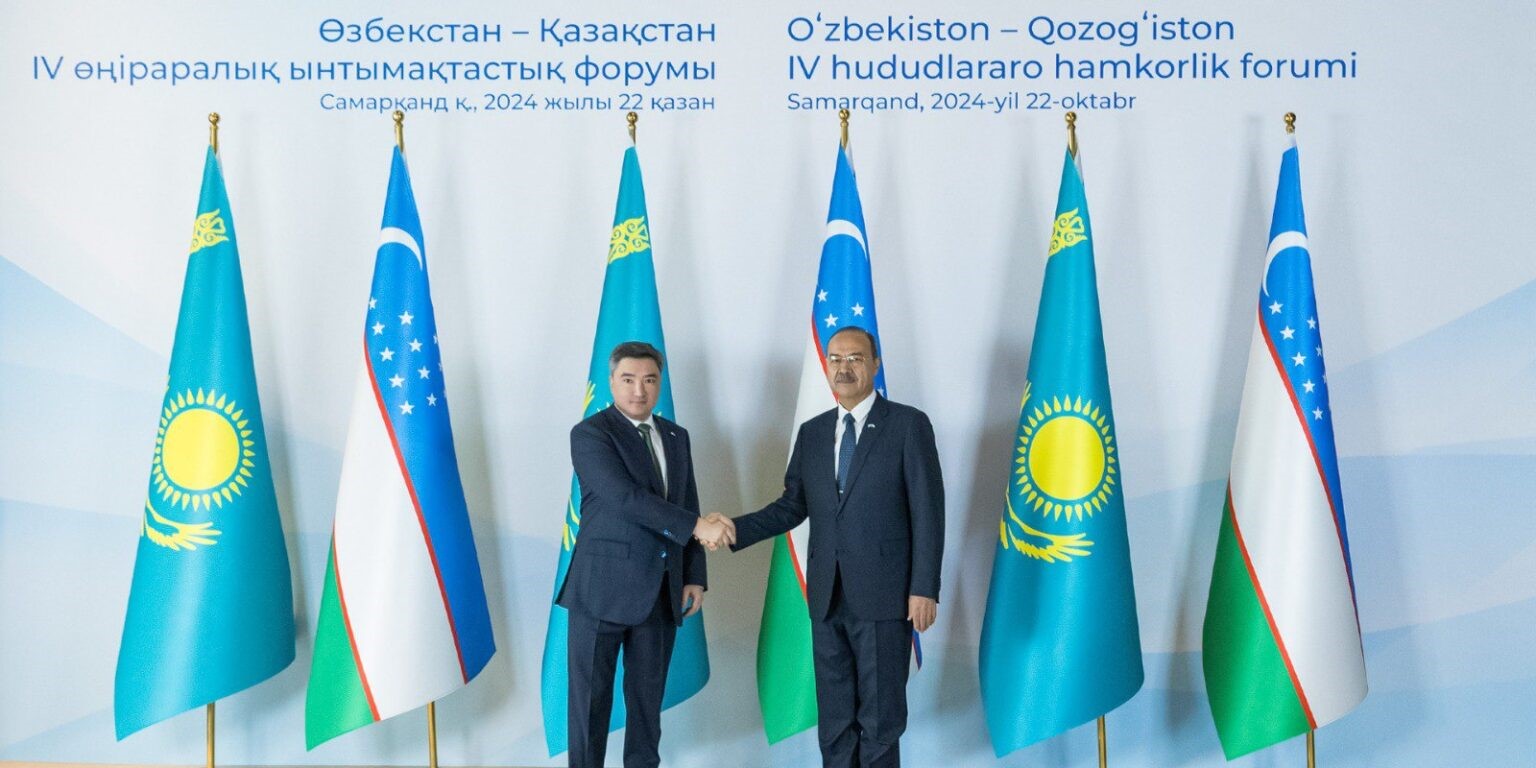Over the past week, the media in the region has covered the annual BRICS summit in Kazan. Despite Kazakhstan declining to become a full member, both Kazakhstan and Uzbekistan became BRICS partners. They also focused on Kazakhstan’s record grain harvest and its efforts to increase exports to new markets. Many outlets reported on the 4th Kazakhstan-Uzbekistan Interregional Cooperation Forum in Samarkand and the various initiatives undertaken. Several sources also remarked that Kazakhstan reduced oil deliveries through the Druzhba pipeline to Germany. Numerous Kazakhstani organizations also concentrated on the efforts of Chinese companies to expand their presence in the country. Ahead of COP 29 later this year, some publications remarked on Kazakhstan and Uzbekistan’s plans to join the “Caspian-Black Sea-Europe” green energy corridor.

President Kassym-Jomart Tokayev speaks at the BRICS plenary session. Source: Akorda
Diplomatic Events
From October 22-24, the annual BRICS summit was held in Kazan (The Astana Times). In attendance were the leaders of the organization’s new members, Egypt, Saudi Arabia, Iran, and Ethiopia, as well as several other heads of state from around the world, including the heads of state of the Central Asian states. In recent weeks, Kazakhstan opted to retain its observer status and declined to join the BRICS grouping, maintaining that the UN was “the sole platform for addressing crucial global issues.” However, Kazakhstan and Uzbekistan attained the status of BRICS partner countries along with 11 other countries in another significant expansion of the grouping (Daryo). Partner countries are not full members and do not have voting rights, but they can cooperate with member states on specific initiatives. Despite Kazakhstan’s decision not to apply for membership, President Tokayev referred to it as “a global center of attraction” in his remarks (Kazinform). Kazakhstan and other Central Asian states will probably apply in the future as they search for alternative payment systems to conduct trade with their increasingly sanctioned principal trading partners like China and Russia.

The BRICS Summit was held in Kazan, Russia, from October 22 to 24, 2024. Source: RIA Novosti
Infrastructure
The Asian Development Bank (ADB) has approved a $86.67 million grant to improve Tajikistan’s road network and develop a green corridor (Asia Plus). The project will upgrade the dilapidated two-lane 49 km Danghara–Guliston road and widen it to four lanes. During construction, the project will employ the methods in the ADB’s green road toolkit. The toolkit aims to strengthen climate resilience and reduce the environmental impact of critical infrastructure. The project also aims to boost the usage of electric vehicles by building two charging stations and attracting private funding for additional stations. The new road will also have dedicated cycleways, pedestrian paths, and improved lighting. The Tajikistani government will also provide $23 million for the project.
Agriculture
This year, Kazakhstan produced a record grain harvest (The Astana Times). In 2024, Kazakhstan cultivated 23.3 million hectares of crops, including 16.7 million hectares of grain. According to the Kazakh Minister of Agriculture Aidarbek Saparov, Kazakhstani producers harvested 26.5 million tons of grain, of which 12 million tons will be exported. The Kazakhstani PM Olzhas Bektenov noted the increased investment in the sector. He remarked that preferential financing for the industry reached $1.2 billion this year and will rise to $1.4 billion in 2025. He added that Kazakhstan should continue to supply traditional and new markets, such as Latin American and South-East Asian countries. In his Republic Day address, President Tokayev announced additional funding of 2.6 trillion tenge for 865 agricultural projects, including leasing machines and acquiring seeds and fertilizers. This week, a Chinese delegation from China Grain Reserves Group Ltd., CITIC Construction, and the China Association for the Promotion of International Agricultural Cooperation visited Kazakhstan, aiming to negotiate a resumption of grain imports from Kazakhstan (Kursiv). In August, Chinese customs officials banned Kazakhstani grain exports to Xinjiang earlier this year. However, in October, the Kazakhstani cabinet proposed increasing grain exports to China to three million tons by the end of the year. So far, the country has exported 1.3 million tons to China in the first nine months of the year. Vice Minister of Trade and Integration Kairat Torobaev indicated that Kazakhstan hopes to begin exporting wheat to Europe (Kazinform). This comes amid news that Kazakhstan’s wheat exports decreased by 39.2% in the first nine months of the year to 3.13 million tons. This was due to reduced demand in crucial markets and low yields last year (Kazinform).
Investment
Chinese automaker FAW plans to invest $100 million in a new truck manufacturing plant in Andijan, Uzbekistan (Kun). The new plant will be built in the "Ipak Yuli" industrial zone and will produce over 10000 vehicles annually. This investment follows FAW's initial investment of $15 million in its first truck manufacturing plant in Andijan in collaboration with UzAuto Trailer and Vodiy Universal Majmua. Construction on the new facility is due to begin in November.
Last week, Uzbekistani President Shavkat Mirziyoyev held a meeting focusing on public-private partnerships and attracting foreign investments (UZ Daily). Over the past seven years, Uzbekistan has attracted over $78 billion in foreign direct investment, contributing to the launch of 1000 projects. Currently, 366 projects valued at $140 billion are underway across numerous sectors. They placed a particular emphasis on producing and exporting high-end goods, especially in the automotive industry. Under the 2030 energy sector development plan, they are also spending $36 billion on establishing 64 energy facilities. Recently, $30 billion was allocated to various public-private partnerships, including $10 billion for transport, $6 billion for the social sector, and $5 billion for public utilities. They also discussed current trends of foreign direct investment. So far this year, Uzbekistan received $23.66 billion in foreign investments, and 120 major production facilities valued at $4.6 billion were launched. Between 2017 and 2024, Uzbekistan is expected to attract over $100 billion in foreign investment.

President Mirziyoyev reviews foreign investments in Uzbekistan. Source: KUN.uz
China Construction Fifth Engineering Division Corp and BSM Group Limited announced they will construct the "Two Regions - One Park" special industrial zone in Chirchik, Uzbekistan (Kazinform). Construction will commence in January 2025. The park will eventually house 20 textile, engineering, pharmaceutical, and construction enterprises. The projects aim to attract over $200 million in foreign investment. China Triumph International Engineering and China Xiaou Group plan to establish a similar industrial zone in Fergana to produce cars from locally sourced components under a new brand.
Chairman of Kazakh Invest Yerzhan Yelekeyev recently met with representatives of Chinese companies during a working visit to the country (The Astana Times). He met with Fufeng Group Chairman Li Xuechun to discuss an agricultural processing plant that would process 500000 tons of grain annually and create 1000 jobs. With Dr. Liu Guoyue, the chairman of CHN Energy, he reviewed a new coal project that would require an investment of $4 billion in Kazakhstan’s coal deposits. The chairman held a meeting with Jiang Yi, the chairman of China Huadian Corporation, who updated him on a planned $190 million, 160-megawatt combined-cycle gas plant in the Mangystau Region. Wanlin Group Founder Li Yantao noted his company’s plans to invest $30 million in a dehydrated onion factory. He also met with several other firms considering investing up to $2 billion in wheat processing initiatives in the Almaty and Akmola regions. At a meeting with Xiong Xiong, the chairman of Shanghai Shanyuhai Investment Group, he discussed a $200 million mining and processing plant in the Almaty Region. The chairman also negotiated with Beijing Jianlong Heavy Industry Group on building a new steel plant. At another meeting, representatives of Beiqi Foton Motor reiterated their plans to build a commercial vehicle assembly plant. Finally, he met numerous other enterprises aiming to invest in Kazakhstan's solar energy and titanium production.
On October 22, Kazakhstan and Uzbekistan held the fourth iteration of their interregional cooperation forum in Samarkand (UZ Daily). The forum was attended by regional leaders and entrepreneurs from both countries and aimed to strengthen dialogue between the public and business sectors. Trade between the two countries amounted to $4.4 billion last year, and each side reiterated its commitment to increasing trade to $10 billion in the coming years. Participants also focused on implementing 74 joint industrial projects valued at $3.4 billion, creating 14600 jobs across the two countries (The Times of Central Asia). Both sides also signed 76 documents worth $325 million concerning the energy and mining sectors, among others (Kazakhstan Newsline). During the forum, the governor of the Mangistau region, Nurdaulet Kilibai, also suggested the construction of a duty-free zone on the Kazakhstan-Uzbekistan border, which will aim to quadruple trade between Mangistau and Uzbekistan (Kun). The zone would be based on the “Khorgos” duty-free zone on the border between Kazakhstan and China. The governor noted that a new road between Mangistau and Karakalpakstan is already under construction and will pass through the “Tazhen” border crossing. A new customs terminal at the “Tazhen” border post is also near completion. The new terminal will handle 350 trucks daily and increase cross-border capacity threefold. Overall, these measures seek to improve trade efficiency between Kazakhstan and Uzbekistan.

Kazakhstan and Uzbekistan hold Interregional Cooperation Forum. Source: Times of Central Asia
Energy
In the first nine months of 2024, Uzbekistan experienced a noteworthy fall in oil and gas production (Kun). This year, Uzbekistan produced 35.16 billion cubic meters of gas, down 1.67 billion cubic meters compared to the same period last year. Gas production decreased by 4.8% and oil by 7.3%. Despite this drop in production, gas exports have risen by 16.5%, reaching $480 million this year. More specifically, gas exports to China surged to $97.4 million in September, a twofold increase compared to September 2023 (Kun). Over the past years, gas extraction in Uzbekistan has been falling. In 2022, it decreased by 4%, and in 2023 by 9.6%. This decline has led to a steep rise in gas imports, which have increased by 2.6 times or $1.278 billion this year. Notably, gas exports have not declined until recently. Nevertheless, coal production rose by 19.4% and total electricity output by 4.3% or 2.5 billion kilowatt-hours (kWh). Uzbekistan also increased its renewable energy production this year, producing 4 billion kilowatt-hours (kWh) from its wind and solar plants (Kun).
KazTransOil, a subsidiary of KazMunayGaz, announced that it will reduce oil deliveries to Germany through the Druzhba pipeline by 11% (133000 barrels) in October (Kursiv). Meanwhile, it expects to increase oil deliveries through the Baku-Tbilisi-Ceyhan (BTC) pipeline by 12% (160000 barrels). Experts claim the reduction in supply is due to the ongoing repair works at the Karachaganak field, while the increased flow of supplies through the BTC pipeline is linked to the completion of repairs at the Tengiz field. Kazakhstan has dramatically increased oil deliveries to Germany this year by 83%. So far, they have delivered 1.08 million tons and plan to exceed their 2024 target of 1.2 million. Both Germany and Kazakhstan are exploring raising supplies to 2 million tons annually. In the first nine months of the year, Kazakhstan's oil exports through the BTC increased by 10% to 1 million tons, and they signed an agreement with Azerbaijan to eventually increase exports to 2.2 million tons.
According to the Azerbaijani Energy Minister Parviz Shahbazov, the governments of Azerbaijan, Kazakhstan, and Uzbekistan will sign the “Intergovernmental Agreement between Azerbaijan, Kazakhstan, and Uzbekistan on Strategic Partnership in the Development and Transmission of Green Energy” at COP 29 in Baku (Kazinform). The governments aim to connect Central Asia with the “Caspian-Black Sea-Europe” green energy corridor, which will strengthen Europe’s energy security and Central Asia’s energy transition by facilitating the supply of renewable electricity from Azerbaijan and Central Asia.

